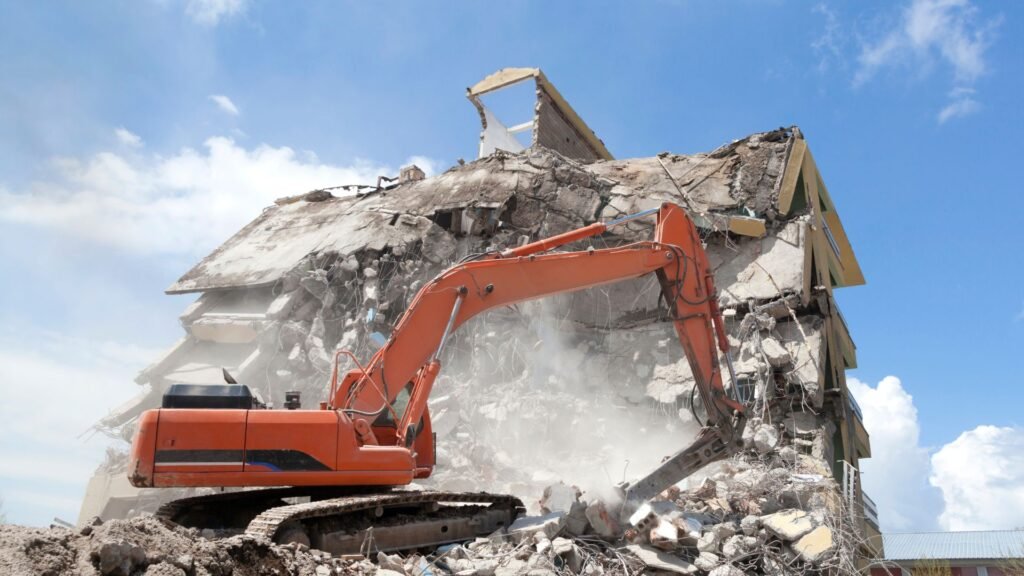Welcome to your go-to guide on demolition costs in New Zealand. Whether you’re planning to knock down an old house, remove a garage, or clear space for something new, understanding the price tag is key. Demolition isn’t just about smashing walls, it involves permits, safety checks, hazardous material removal, and proper site cleanup. Costs can range widely depending on the size of the structure, location, materials, and access to the site. In this post, you’ll get a clear breakdown of average demolition prices across NZ, what factors drive those costs up or down, and how to budget smart for your next project.
The average cost for demolition services in NZ ranges from $80 to $150+ per square metre, depending on the size of the structure, materials used, location, and site access. A full house demolition typically costs between $15,000 and $30,000, while smaller jobs like garage or shed removal may start from $3,000. Additional costs may apply for permits, asbestos removal, and waste disposal.
Table of Contents
Average Demolition Costs In New Zealand
Understanding the average cost of demolition services in New Zealand helps you budget more accurately and avoid surprise expenses. Whether you’re planning to take down an old home, remove a detached garage, or clear a commercial site, costs will vary depending on the project’s scope, location, and complexity.
General Cost Per Square Metre
In New Zealand, demolition services typically range from $80 to $150+ per square metre for a standard residential structure. This range includes labor, equipment, and disposal, but may increase if the site is difficult to access or requires specialist handling, such as asbestos removal or tight urban working conditions.
Full House Demolition
The cost to demolish a full residential house depends on its size, building materials, and location. On average, homeowners can expect to pay between $15,000 and $30,000. Timber-framed homes generally fall on the lower end of the price scale, while concrete or brick structures tend to cost more due to the heavier equipment and labor required.
Small Garage Or Shed
Smaller structures like garages, sheds, or carports are cheaper to demolish. These projects often range from $3,000 to $8,000, depending on their size and foundation type. If the structure is freestanding and easily accessible, costs may come down further.
Commercial Buildings
Commercial demolition projects are usually larger and more complex. Costs typically start from $30,000 and can reach over $100,000, depending on the size of the building, the materials used, and any additional requirements such as structural engineering, hazardous material disposal, or traffic management plans.
Regional Differences
Where you live in New Zealand also impacts demolition pricing. For example:
- Auckland: Higher rates due to increased demand, higher labor costs, and stricter regulations. Prices tend to sit at the upper end of the scale.
- Christchurch: Mid-range pricing, especially for earthquake-prone properties that may need extra safety assessments.
- Smaller towns: Demolition services may be more affordable, but travel or access fees could apply if equipment needs to be transported from out of town.
Estimated Cost Table
Here’s a simple breakdown of estimated demolition costs by project type:
| Project Type | Estimated Cost Range (NZD) |
| Full House (120m²) | $15,000 – $30,000 |
| Small Garage or Shed | $3,000 – $8,000 |
| Commercial Building | $30,000 – $100,000+ |
| Per Square Metre (avg.) | $80 – $150+ |
Keep in mind, these are starting estimates. For an accurate quote, it’s best to request an on-site inspection from a licensed contractor who understands local conditions and council requirements.
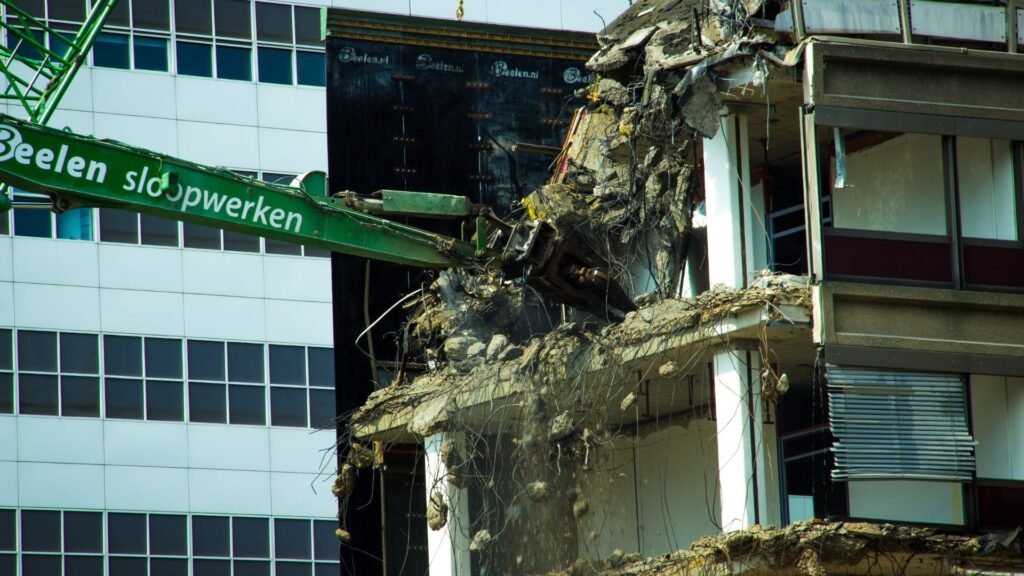
Key Factors That Affect Demolition Costs
The cost of demolition in New Zealand isn’t one-size-fits-all. Multiple factors play a role in determining how much you’ll end up paying. Whether you’re removing a small shed or tearing down an entire house, understanding these variables can help you plan your budget more accurately. Below are the key elements that influence the final cost, each with real-world relevance.
Size And Complexity Of The Structure
The bigger the structure, the more it will cost to demolish. Larger buildings require more time, labour, and equipment to take down safely.
- A single-storey timber home is quicker and cheaper to demolish than a double-storey brick house with reinforced concrete.
- Complex structures, like those with basements, retaining walls, or multiple extensions, take more time and precision, which increases labour and equipment hours.
For example, a 100m² house might cost around $15,000–$18,000 to demolish, while a 200m² structure could exceed $30,000, depending on its build and layout.
Material Type (Timber, Brick, Concrete, Asbestos)
The type of materials used in the building affects both the demolition method and disposal costs.
- Timber is easier and faster to dismantle, making it more affordable.
- Brick and concrete are heavier, harder to break down, and more expensive to remove.
- Asbestos-containing materials require licensed professionals for safe removal, testing, and disposal, adding significant cost.
If your home was built before the 1990s, there’s a higher chance that asbestos might be present in roofing, insulation, or wall linings.
Site Access And Location
Good access can lower your demolition cost. If your property is difficult to reach, contractors may need to use smaller machinery or manual labour, both of which raise the price.
- Homes located on narrow streets or steep hillsides often require extra planning and time.
- Inner-city properties may also need traffic management plans or noise restrictions, which can increase overall cost.
In contrast, a flat suburban site with wide access allows for faster, more efficient work using standard equipment.
Presence Of Hazardous Materials (Like Asbestos Testing And Removal)
Hazardous materials like asbestos must be identified and dealt with before any demolition begins. This adds cost due to:
- Specialist testing and reporting
- Licensed asbestos removal services
- Proper containment, transport, and disposal
A typical asbestos removal job in NZ can range from $2,000 to $15,000, depending on how much material is found and where it’s located.
Ignoring asbestos can result in serious legal and safety issues, so this step is not optional.
Permit Requirements And Council Regulations
Most demolition projects in NZ require a building consent from your local council. This is especially true for:
- Complete structure removal
- Properties in heritage zones
- Commercial buildings
Permit fees vary between councils but typically range from $500 to over $2,000. You may also need additional documentation like engineering reports or site management plans, which add to the overall cost.
Failing to secure the right permits can result in fines or project delays.
Labour And Machinery Needs
The number of workers and the type of machinery needed directly impact the final cost.
- Smaller demolitions may only require a couple of labourers and an excavator.
- Larger or more complex jobs may need cranes, bobcats, or even partial manual demolition to protect surrounding structures.
Labour costs can range from $40 to $80 per hour, depending on location and experience. Machinery hire is often charged per hour or included in the total quote, with rates varying based on the type and size of equipment.
Waste Removal And Recycling Requirements
Once the building is down, all debris must be removed. Disposal isn’t cheap, especially when done properly.
- Tipping fees, fuel costs, and transport charges all add up.
- Sorting recyclable materials (like metal, concrete, or wood) may lower landfill costs but requires more time and effort.
- Some companies offer discounts if materials can be salvaged for reuse or resale.
In some regions, landfill costs are higher, and regulations require that certain materials be disposed of in specific ways. This affects both cost and timeline.
Each of these factors adds a layer of complexity to your project’s total cost. The more you understand them, the easier it becomes to plan, avoid surprises, and choose the right contractor for the job. Want help getting a tailored quote based on your property? Reach out to a local demolition expert to assess your site.
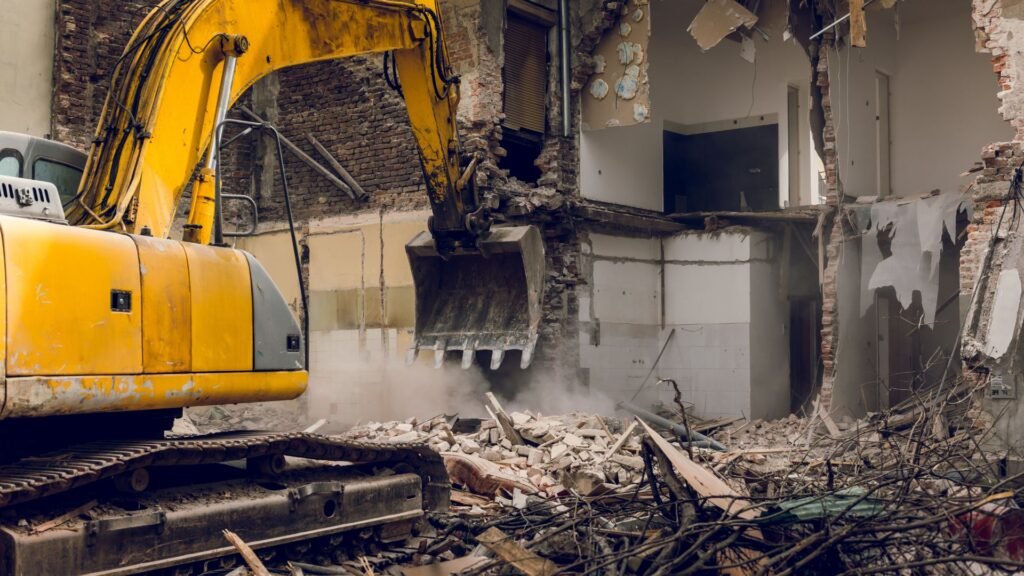
Residential Vs Commercial Demolition Costs
Demolition costs in New Zealand can vary significantly depending on whether the project is residential or commercial. While both types involve removing structures, the complexity, scale, and compliance requirements are often quite different. If you’re planning to demolish a home or a commercial building, it’s essential to understand what drives the pricing for each so you can budget with confidence.
What Makes Commercial Jobs More Expensive?
- Larger Scale And Structural Complexity
Commercial buildings are usually bigger and more structurally complex than homes. They often have multiple levels, steel frameworks, reinforced concrete, and large roofing systems that require advanced machinery and careful dismantling. This leads to longer project timelines and higher labour costs. - Specialized Equipment Requirements
Demolishing a commercial building usually needs heavy-duty equipment like high-reach excavators, hydraulic crushers, and industrial cranes. These machines come with high rental costs and require licensed operators, which adds to the total bill. - Strict Health And Safety Compliance
Commercial demolitions must follow stricter workplace safety and environmental regulations under New Zealand’s Health and Safety at Work Act. This includes detailed demolition plans, engineer sign-offs, noise and dust control, hazardous material assessments, and traffic management for urban sites. Compliance isn’t optional, and meeting these standards adds both time and cost. - Waste Management And Recycling Standards
There’s usually more waste to process during commercial demolitions. Items like metal framing, concrete slabs, glass panels, and insulation materials need sorting and removal in line with local council and environmental guidelines. This often involves more skips, labour, and time to meet disposal or recycling requirements.
Real NZ Examples Or Typical Cost Differences
- Residential example: A 3-bedroom home (around 120m²) in Auckland might cost between $18,000 and $25,000 to demolish. This includes permits, utility disconnection, labour, and waste removal.
- Commercial example: A small warehouse or office building (300m²+) could start from $40,000 and quickly exceed $100,000 depending on structural materials, location, and compliance requirements.
In Wellington’s central business district, the cost to demolish a multi-storey commercial site can exceed $150,000, especially if asbestos removal or extensive safety management is involved.
Commercial demolition projects in NZ cost more because they demand more planning, more equipment, and more regulatory oversight. If you’re unsure where your project falls on the scale, getting a site-specific quote from a qualified demolition contractor will give you a clearer picture.
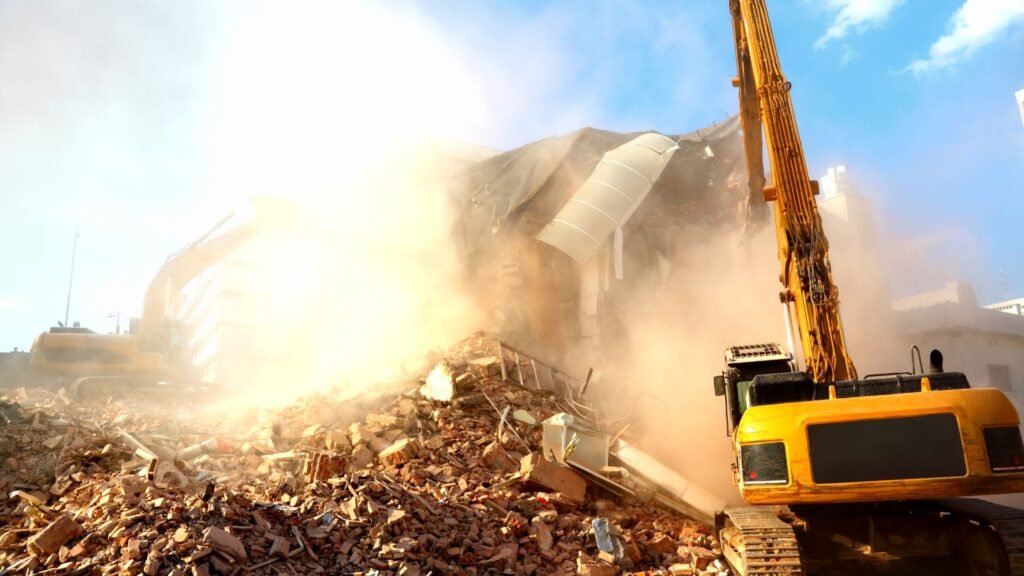
Hidden Costs To Watch Out For
When planning for demolition in New Zealand, it’s easy to focus only on the main quote. But there are often hidden costs that can catch you off guard if you’re not prepared. These extra expenses don’t always show up in the first estimate from your contractor. Knowing what to expect will help you budget more accurately and avoid last-minute surprises.
Permit And Inspection Fees
Before any demolition work starts, you’ll likely need a permit from your local council. This is a legal requirement in most parts of New Zealand. The cost of a demolition permit varies by region but can range from a few hundred to over a thousand dollars. In some cases, you may also need an engineer’s report or pre-demolition inspection, especially if the structure is large, old, or near other properties. These inspections ensure the site is safe for demolition, and the structure doesn’t pose risks to nearby buildings or the public.
Utility Disconnections (Gas, Water, Electricity)
Demolition can’t begin until all utilities are safely disconnected. This includes gas lines, water pipes, electrical wiring, and in some cases, telecommunications. Arranging for utility disconnections takes time and coordination with service providers. Each disconnection may come with its fee, often between $200 and $600 per service. If this isn’t handled properly, it could delay your project or create serious safety hazards during the demolition process.
Asbestos Testing And Removal
If your property was built before the year 2000, there’s a chance it may contain asbestos. Materials like roofing, cladding, ceilings, and flooring may be affected. Before demolition, you’ll need to hire licensed asbestos inspectors to test for it. If found, certified professionals must safely remove and dispose of the material under strict regulations. Asbestos removal costs in NZ can range from $1,000 to over $10,000, depending on the extent of contamination. This is one of the most common hidden costs in older homes.
Post-Demolition Cleanup And Leveling
Once the structure is gone, the job isn’t finished. Cleanup and land leveling are usually required to prepare the site for the next stage, whether that’s rebuilding, landscaping, or selling. Cleanup includes removing all leftover debris, nails, foundations, or concrete slabs. Leveling ensures the ground is even and safe to work on. Some demolition contractors include this in their quotes, while others charge extra. It’s worth confirming in writing what’s covered and what isn’t.
Extra Charges For Difficult Terrain Or Tight Access
Not all demolition sites are easy to reach. If your property is located on a steep slope, has limited vehicle access, or sits close to neighboring buildings, expect additional costs. These situations require extra planning, special equipment, or more labor. For example, a house on a hill may need cranes or extra machinery to safely carry out the job. A tight urban lot might require smaller equipment or more manual work. These conditions can drive up the total cost by thousands.
Being aware of these hidden costs upfront can make all the difference in planning a smooth demolition project. Always ask for a full, detailed quote and have open discussions with your contractor before work begins. The more transparent the process, the fewer financial surprises you’ll face along the way.

How To Get An Accurate Quote
Getting an accurate quote for demolition services in NZ is one of the most effective ways to avoid hidden costs and delays. A good quote gives you more than just a ballpark figure, it gives you clarity. It helps you understand exactly what you’re paying for and allows you to compare contractors fairly. Below is a breakdown of what to expect and ask when you’re requesting a quote.
Why Site Visits Matter
Contractors need to inspect the site to provide a reliable estimate. Without a visit, they’re guessing, and you’re the one who could end up paying more than expected. During a site visit, they can assess the size of the structure, access points, surrounding buildings, soil conditions, and potential hazards. They’ll also look for anything that could slow the job down, like tight spaces for machinery or the presence of asbestos.
A contractor who skips the site visit or offers a quote without seeing the location may not fully understand the scope of the work. That’s a red flag.
What To Ask The Contractor
To avoid surprises, ask direct questions. Here are a few examples you can bring up during the quoting process:
- Does the quote include all permit and council fees?
- How do you handle asbestos if it’s found?
- Are dumping and cleanup costs part of the total price?
- Do you manage utility disconnections (gas, water, power)?
- What’s the estimated timeline from start to finish?
- Is site cleanup and debris removal included?
These questions don’t just clarify costs, they show the contractor that you’ve done your homework.
What Should Be Included In A Detailed Quote
A clear, itemised quote should cover everything from labour to final cleanup. If anything’s missing, ask about it. A vague or incomplete quote often leads to extra charges down the line. Below are the key components every proper demolition quote should include:
Labour
This is often the biggest part of the quote. It should cover all crew members involved in the job, from equipment operators to safety personnel. Labour rates can vary depending on the complexity of the project and the experience of the team.
Machinery
Different jobs require different types of equipment. Small residential demolitions may use excavators or bobcats, while larger buildings could require cranes or concrete breakers. The quote should specify what machines will be used and for how long.
Dumping Fees
All the rubble, wood, concrete, and metal have to go somewhere. Dumping and waste disposal fees are often overlooked by homeowners but can add thousands to a project. The quote should outline how waste will be handled and whether it includes tipping fees at local landfills or recycling centers.
Safety Precautions
Safety is not optional. Any contractor worth hiring will factor safety measures into the cost. This may include site fencing, signage, dust control, protective gear, and on-site health and safety supervisors. If the building contains hazardous materials, extra steps (and costs) will be required.
Getting a detailed and accurate quote isn’t just about the final price, it’s about peace of mind. The more specific the quote, the fewer surprises you’ll face once work begins. Always compare at least two to three quotes before making your decision, and never assume something is included unless it’s written down.
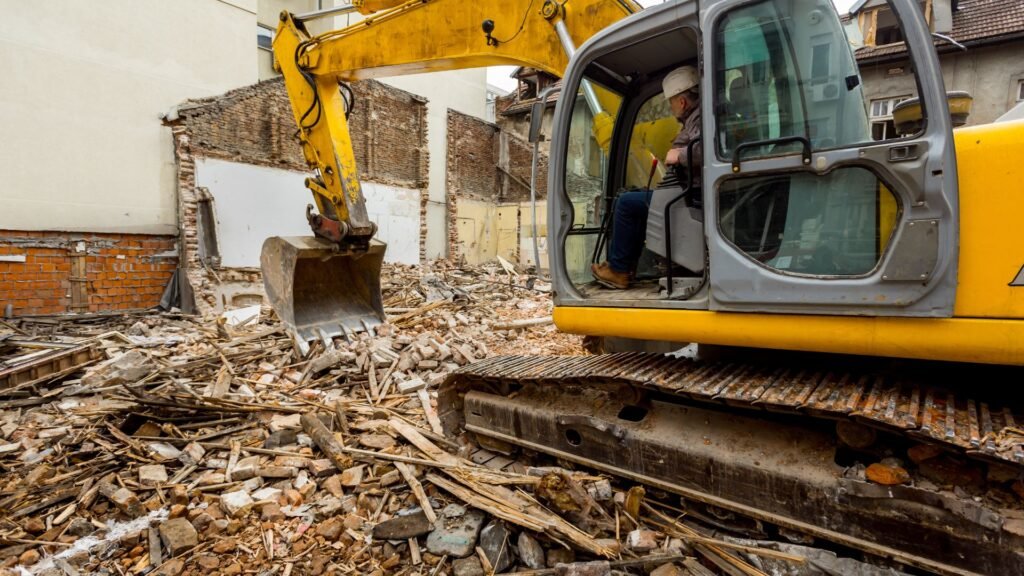
Tips To Save On Demolition Costs
Demolition can be expensive, but with a bit of planning, you can bring the price down without cutting corners. Whether you’re demolishing a small structure or a full home, there are smart ways to stay on budget. Here’s how to reduce demolition costs while keeping the process safe and efficient.
Salvage Usable Materials
Before the crew knocks anything down, take a walk through the site and look for anything that can be salvaged. Items like hardwood floors, kitchen cabinets, doors, bricks, and bathroom fittings can often be reused, sold, or donated. Some demolition contractors may even offer a discount if they can reclaim and resell materials. This not only cuts your costs but also reduces waste and supports sustainability.
Get Multiple Quotes
Don’t settle for the first contractor you find. Reach out to at least three demolition companies in your area. Ask for detailed quotes that break down labor, machinery, permit handling, waste disposal, and safety precautions. Comparing these quotes gives you a better idea of the going rates and helps you avoid overpaying. It also gives you a chance to spot red flags, like missing details or unclear pricing.
Book In Off-Peak Seasons
Like many industries, demolition has busy and slow periods. If your timeline is flexible, try to schedule work during the off-peak season, usually in the colder months. Contractors may offer lower rates when demand is lower, and you’re more likely to get on the schedule quickly. Just make sure the weather won’t interfere with your specific project, especially if heavy machinery is needed.
Prepare The Site Yourself (If Safe/Legal)
Some simple tasks can be handled by you before the crew arrives. Removing furniture, disconnecting appliances, clearing outdoor items, or taking down fencing (if it’s safe) can reduce labor hours on the contractor’s end. Always check with your contractor first to confirm what’s allowed, and never attempt anything involving structural elements or hazardous materials.
Avoid Delays With Clear Communication
Time is money on a demolition site. Misunderstandings about timelines, access, or project scope can lead to delays that cost you extra. From the first meeting, be clear about your expectations, deadlines, and responsibilities. Confirm everything in writing, including any changes along the way. The smoother the process, the less likely you’ll face unexpected fees or schedule overruns.
These simple steps can lead to real savings without compromising safety or quality. Demolition might seem straightforward, but being proactive with your budget, timing, and planning makes a big difference. Always work with professionals who are transparent and experienced; you’ll avoid costly mistakes and get the job done right.
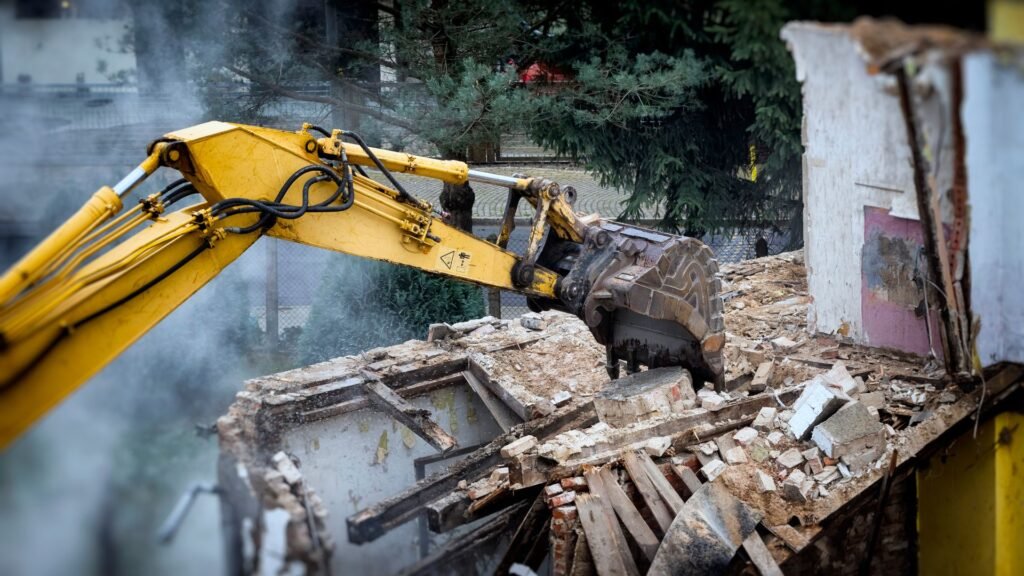
Choosing A Reliable Demolition Contractor In NZ
Hiring the right demolition contractor can make or break your project. Whether you’re tearing down a house, garage, or commercial building, you need someone who knows the job, follows safety rules, and charges fairly. Here’s how to choose a contractor you can trust and avoid costly mistakes.
Licensed And Insured
Always check if the contractor is licensed to carry out demolition work in New Zealand. Licensing proves they’ve met the industry standards and follow local building laws. Insurance is just as important. A properly insured contractor protects you from liability if there’s an accident, damage, or injury during the job. Ask to see their public liability and worksite insurance certificates before signing anything.
Experience With Similar Projects
Not all demolitions are the same. A contractor who’s only done small shed removals may not be the right fit for a large commercial demo. Ask about their experience with projects like yours. Have they worked in your area before? Do they know how to handle specific materials, like asbestos or concrete? A contractor who understands your type of project will likely work faster, safer, and more efficiently.
Positive Reviews Or Case Studies
Word of mouth still matters. Look for contractors with positive online reviews on Google, Facebook, or trade directories. If they have a website, check for case studies or photos of past jobs. This gives you a clear idea of their work quality and professionalism. Don’t rely on star ratings alone; read the comments to see how they handle delays, surprises, or cleanup.
Questions To Ask Before Hiring
A reliable contractor won’t shy away from questions. Here are a few questions to ask during the consultation:
- What’s included in your quote?
- How long will the project take?
- Will you handle permits and waste disposal?
- Do you subcontract any of the work?
- How do you manage safety on-site?
Their answers should be clear and confident. Vague or hesitant replies could signal inexperience or a lack of transparency.
Red Flags To Avoid
Some signs should make you walk away immediately. These include:
- No physical address or website
- Unwillingness to provide references or insurance proof
- Pressure to pay in full up front
- Extremely low quotes that seem too good to be true
- Poor communication or last-minute changes
A professional contractor will be upfront about pricing, safety, and timelines. If they seem disorganized or difficult to reach before the job starts, expect more problems down the line.
Choosing the right demolition contractor in NZ isn’t just about price. It’s about trust, safety, and knowing the job will be done right. Take your time, compare a few quotes, and go with the team that communicates clearly and brings experience to the table.
Need a clear quote for your demolition project? Visit us and find out how we can help you get started, on time and within budget.
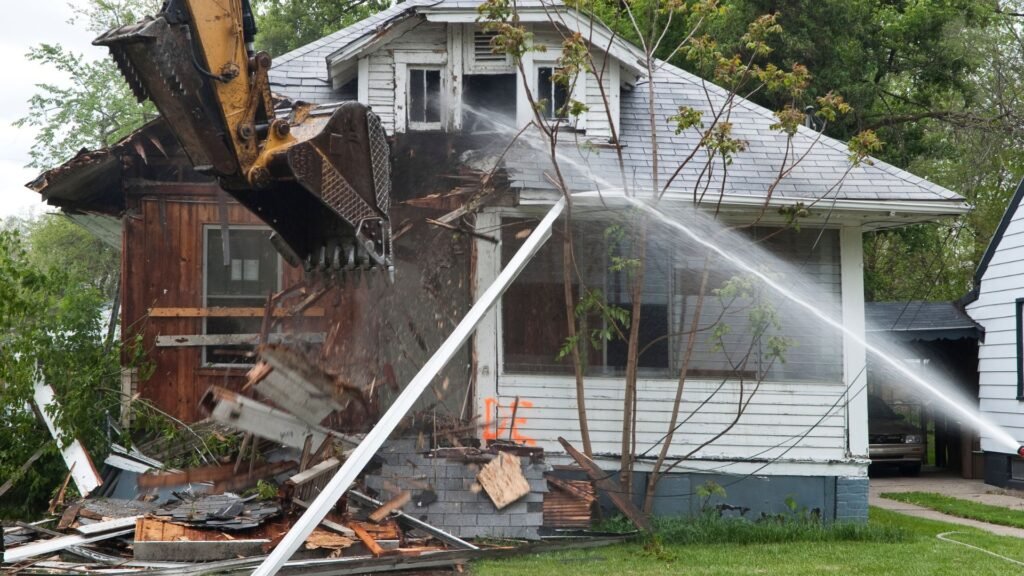
FAQs: About Cost For Demolition Services NZ
How much does it cost to demolish a house in NZ?
The average cost to demolish a standard house in New Zealand ranges from $15,000 to $30,000. The total depends on factors like size, structure type, site access, and whether hazardous materials like asbestos are present.
What is the cost per square metre for demolition in NZ?
Demolition in NZ typically costs between $80 and $150+ per square metre. Costs can increase for complex demolitions or poor site conditions.
What factors affect demolition pricing in New Zealand?
Key factors include the structure’s size, building materials, site access, hazardous material removal, council permits, and waste disposal fees.
Do I need a permit for demolition work in NZ?
Yes, most demolition projects require a building consent or permit from your local council. Permit costs vary based on the scope of the job and region.
How much does it cost to remove a garage or small structure?
Small structures like garages or sheds may cost between $3,000 and $8,000, depending on size, materials, and ease of access to the site.
Is asbestos removal included in demolition costs?
No, asbestos removal is usually a separate cost. If asbestos is found, licensed professionals must remove it safely before demolition begins, which can add several thousand dollars.
Can I demolish a house myself to save money?
DIY demolition is not recommended due to safety, legal, and environmental concerns. You may still need permits and licensed professionals for specific tasks like asbestos handling or electrical disconnections.
How long does a residential demolition project take?
Most residential demolitions in NZ take 1 to 2 weeks, depending on the size of the building, permit approvals, and weather conditions.
Are there extra costs I should plan for?
Yes. Hidden costs can include permit fees, utility disconnections, hazardous material testing, soil contamination, and site cleanup after the demo.
How do I choose a demolition contractor in NZ?
Look for licensed, insured contractors with solid experience, good reviews, and detailed quotes. Ask about their process, timelines, and what’s included in their pricing.
Conclusion
Demolition costs in New Zealand can vary widely depending on several factors, including the size of the structure, the materials used, site access, and whether hazardous materials like asbestos are present. Understanding these variables can help you avoid unexpected expenses and plan your budget more effectively. Before starting your project, take the time to get multiple quotes from qualified demolition contractors in your area. Compare what’s included in each estimate and ask questions about permits, waste removal, and hidden fees. This not only helps you find the best value but also gives you confidence that the job will be done safely and legally. If you’re unsure where to begin, reaching out to a local expert or scheduling a consultation is a smart next step. They can assess your site, explain the process clearly, and help you move forward with confidence.

